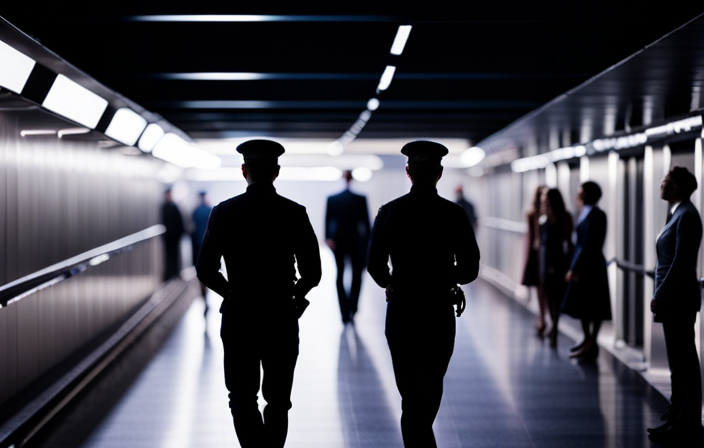Hello! Have you ever considered the consequences of finding yourself in a difficult situation or involved in unlawful activities while on a cruise? Do not worry, as I have gathered all the important information and details you may need.
In this article, we’ll dive into the legal jurisdiction and international laws that come into play, as well as the reporting and investigation procedures that cruise lines follow.
We’ll also explore the different types of crimes and offenses that can occur onboard, and what happens when you’re arrested and detained. Of course, we can’t forget about the legal consequences and punishments you may face.
Plus, we’ll take a look at the security measures in place to prevent crime and how cruise lines cooperate with law enforcement agencies.
So, sit back, relax, and let’s sail through the world of what happens if you commit a crime on a cruise ship!
Key Takeaways
- Strict security measures, including surveillance cameras, access control systems, and trained security personnel, are implemented on cruise ships to prevent crime.
- The controlled environment and security measures contribute to relatively low crime rates on cruise ships.
- Cruise lines have zero tolerance for criminal behavior and take immediate action against illegal activities, including conducting thorough investigations.
- Victims of crimes on cruise ships have legal rights and support, including the right to consult maritime law specialists, receive legal representation, and access resources for recovery.

FAMVIVA 2K Security Camera, Outdoor/Indoor for Home, Pet, Baby, Nanny, IP65 Waterproof Color Night Vision, White Light & Siren, Recording, Motion Detection, Compatible with Alexa, White-4P
[IP65 Waterproof & Versatile Home Security Camere]-Designed for durability, our Famviva 2K security camera is IP65 waterproof, ensuring…
As an affiliate, we earn on qualifying purchases.
As an affiliate, we earn on qualifying purchases.
Legal Jurisdiction and International Laws
If you commit a crime on a cruise ship, you’ll find yourself in a legal labyrinth where jurisdictional lines blur and international laws come into play, making the consequences of your actions even more complex and intriguing.
When it comes to legal jurisdiction, things can get tricky. Cruise ships typically sail in international waters, which means they’re subject to the laws of the country where they’re registered. However, they also need to abide by the laws of the countries they visit. This can lead to confusion when determining which country has the authority to prosecute a crime.
Additionally, extradition processes can be challenging due to the involvement of multiple countries and their respective legal systems. Furthermore, diplomatic immunity can complicate matters, as certain individuals on board may be immune from prosecution.
These factors make reporting and investigation procedures even more crucial in ensuring justice is served.

Anchor & Gavel: A Practical Guide to Maritime Law and the Legal Seas
As an affiliate, we earn on qualifying purchases.
As an affiliate, we earn on qualifying purchases.
Reporting and Investigation Procedures
When an incident occurs on a cruise ship, the reporting and investigation procedures are swiftly activated, ensuring that all parties involved are held accountable. The cruise ship staff will immediately notify the ship’s security officer, who will then initiate an internal investigation. This investigation involves collecting evidence, interviewing witnesses, and documenting the incident. If a crime has been committed, legal representation is essential for both the victim and the accused. The cruise ship’s legal team will assist in providing guidance and support throughout the process. In some cases, where the crime committed falls under the jurisdiction of a specific country, extradition procedures may be initiated to transfer the accused to the appropriate legal authorities. These procedures ensure that justice is served and that the necessary legal actions are taken. Moving on to the subsequent section about types of crimes and offenses…
cruise ship surveillance equipment
As an affiliate, we earn on qualifying purchases.
As an affiliate, we earn on qualifying purchases.
Types of Crimes and Offenses
An overview of the various types of crimes and offenses that can occur on a cruise ship will now be presented. Cruise ships are not immune to criminal activities, and it’s important to be aware of the potential risks.
One major concern is cybersecurity threats, as modern cruise liners heavily rely on technology for communication, navigation, and entertainment. Hackers may target the ship’s systems, compromising personal information or even taking control of critical operations.
Additionally, drug trafficking is another serious crime that can occur on a cruise ship. Criminals may use the ship’s numerous ports of call as opportunities to smuggle narcotics. It’s crucial for cruise ship authorities to remain vigilant and cooperate with law enforcement agencies to prevent and address these offenses.
Moving forward to the next section about ‘arrest and detention procedures,’ it’s important to understand how these crimes are dealt with onboard.

Spy Labs Inc: Forensic Investigation Kit by Thames & Kosmos | Includes Large Lab Setup to Collect & Analyze Evidence & Clues | Explore The Science of Detective Work | for Young Investigators
Spy Labs Incorporated's activity kits and equipment provide an engaging and interactive way for kids to learn about…
As an affiliate, we earn on qualifying purchases.
As an affiliate, we earn on qualifying purchases.
Arrest and Detention Procedures
Cruise ship authorities have established strict protocols for the arrest and detention of individuals suspected of criminal activities, ensuring that justice is served and the safety of passengers and crew members is maintained.
When a crime is committed on a cruise ship, the first step is to notify the ship’s security personnel or the captain. They’ll initiate an investigation and collect evidence to build a case against the suspect.
If the evidence is sufficient, the authorities may detain the individual and restrict their movements on the ship. The detained person will be kept in a designated area under constant surveillance.
In serious cases, the ship’s authorities may also contact local law enforcement agencies to assist with the arrest and detention procedures.
The next section will explore the legal consequences and punishments that individuals may face for committing crimes on a cruise ship.
Legal Consequences and Punishments
The legal ramifications and penalties one may face for engaging in criminal activities on board a cruise ship can be severe and far-reaching. Depending on the nature and severity of the crime, individuals can be subject to international extradition and face prosecution in the jurisdiction where the ship is registered or where the crime occurred. Cruise ships operate in international waters, which can complicate legal proceedings and make it difficult for individuals to assert their rights. To navigate these challenges, it is crucial to seek legal counsel and develop effective criminal defense strategies. This may include gathering evidence, challenging jurisdiction, and presenting a compelling defense. It is important to understand that committing a crime on a cruise ship does not exempt individuals from legal consequences. In the next section, we will explore passenger rights and support services available to those who may find themselves in such situations.
Passenger Rights and Support Services
When it comes to passenger rights and support services on a cruise ship, two key areas to consider are victim support and counseling, as well as compensation and insurance claims.
If anyone becomes a victim of a crime or experiences any form of harm while on a cruise ship, it’s essential to have access to proper support and counseling services to help cope with the trauma.
Additionally, understanding the process of filing for compensation and insurance claims is crucial to ensure that victims receive the necessary financial assistance for any damages or losses incurred.
Victim Support and Counseling
If you ever find yourself in need of support or counseling after being victimized on a cruise ship, there are resources available to help you navigate through this difficult time. Victim advocacy organizations can provide you with invaluable support and guidance, helping you understand your rights and options.
They can connect you with trauma counselors who specialize in assisting victims of crimes, offering a safe space for you to express your emotions and work through the aftermath of the incident. These counselors can help you process the trauma you’ve experienced and develop coping mechanisms to aid in your recovery.
It’s important to remember that you’re not alone, and there are professionals who are trained to help you through this challenging period.
Transitioning into the subsequent section about compensation and insurance claims, it’s crucial to explore your legal options to seek the justice and compensation you deserve.
Compensation and Insurance Claims
After receiving support and counseling, victims of crimes on cruise ships may be eligible for compensation and insurance coverage. Compensation eligibility varies depending on the specific circumstances of the crime and the cruise line’s policies.
Some cruise lines have established victim compensation funds to provide financial assistance to victims. These funds may cover medical expenses, lost wages, and other related costs.
Additionally, victims may be able to seek compensation through insurance claims. Cruise lines typically have liability insurance to protect themselves from legal claims, and victims may be able to file claims to seek compensation for their injuries and damages.
It is important for victims to consult with legal professionals who specialize in maritime law to understand their rights and options for compensation. This ensures that victims receive the appropriate support and resources to recover from the crime.
Moving forward, it is crucial to address security measures and crime prevention on cruise ships.
Security Measures and Crime Prevention
One effective way to prevent crime on a cruise ship is by implementing strict security measures. Cruise lines have comprehensive security protocols in place to ensure the safety of passengers and crew members. These measures include a combination of physical security, such as surveillance cameras and access control systems, as well as trained security personnel patrolling the ship.
Additionally, cruise lines often partner with local law enforcement agencies to enhance security during port visits. Crime statistics show that the incidence of crime on cruise ships is relatively low compared to other forms of travel. This can be attributed to the security measures in place, as well as the fact that cruise ships are essentially floating communities with a controlled environment.
However, cruise lines continue to invest in security technology and training to further improve safety onboard. In terms of cooperation with law enforcement agencies, cruise lines work closely with local authorities in the event of a crime. They have established procedures for reporting and investigating incidents, and they fully cooperate with law enforcement agencies to ensure justice is served.
Cooperation with Law Enforcement Agencies
After discussing the security measures and crime prevention on cruise ships, it is important to understand the cooperation between cruise lines and law enforcement agencies. In cases where a crime is committed onboard, cruise lines work closely with international law enforcement agencies to ensure that the perpetrator is brought to justice. This cooperation involves sharing information, providing evidence, and assisting with investigations. International cooperation is crucial as cruise ships often sail in international waters and may visit multiple countries during a voyage. Extradition procedures may also come into play if the crime is committed in one country but the suspect is apprehended in another. This ensures that individuals who commit crimes on cruise ships cannot escape legal consequences by simply disembarking at a different port. With this understanding of cooperation between cruise lines and law enforcement, let’s now delve into the cruise line policies and disciplinary actions.
Cruise Line Policies and Disciplinary Actions
Cruise line policies and disciplinary actions are in place to ensure the safety and well-being of all passengers and crew members. Here are some key points to understand:
-
Zero Tolerance: Cruise lines have a zero tolerance policy towards criminal behavior. Any illegal activity, such as theft or assault, will result in immediate action.
-
Investigation: When a crime is reported, the cruise line’s security team conducts a thorough investigation to gather evidence and identify the perpetrator.
-
Legal Representation: If charged with a crime, passengers have the right to legal representation. Cruise lines provide access to legal advice and assistance during the legal process.
-
Appeals Process: In case of dissatisfaction with the disciplinary action taken by the cruise line, passengers can appeal the decision. This ensures a fair and transparent process for resolving any disputes.
Moving forward to the next section about case studies and notable incidents, it’s important to examine real-life examples to understand the gravity of committing a crime on a cruise ship.
Case Studies and Notable Incidents
Imagine being on a cruise and hearing about the jaw-dropping case studies and notable incidents that have occurred. It’s important to be aware of these incidents to understand the safety measures that are put in place on cruise ships.
One notable case is the disappearance of George Allen Smith IV in 2005. He was on his honeymoon when he mysteriously vanished from the ship.
Another incident involved the Carnival Triumph in 2013, where an engine fire left the ship stranded for days without power.
These incidents highlight the importance of safety precautions on cruise ships. Cruise lines have implemented various measures such as security cameras, trained personnel, and emergency response plans to ensure the safety and well-being of their passengers.
It’s crucial for everyone on board to be familiar with these safety measures in case of any untoward incidents.
Frequently Asked Questions
Can a person be extradited from a foreign country if they committed a crime on a cruise ship?
If I commit a crime on a cruise ship, I can be extradited from a foreign country through the extradition process. The legal jurisdiction for prosecuting the crime would depend on the country where the offense occurred.
Are there any limitations on the cruise ship’s liability for crimes committed onboard?
When it comes to cruise ship liability, there are limitations in place. These limitations outline the extent to which the cruise ship can be held responsible for crimes committed onboard.
What happens if someone commits a crime on a cruise ship but escapes before authorities can apprehend them?
If someone commits a crime on a cruise ship but escapes before authorities can apprehend them, it can be challenging to hold them accountable due to legal jurisdiction issues. They may face escape-related repercussions if caught.
Are crew members subject to the same legal consequences and punishments as passengers if they commit a crime onboard?
Crew members are subject to the same legal consequences and punishments as passengers if they commit a crime onboard. They are held accountable under the legal jurisdiction of the country where the ship is registered.
How does the cruise line handle cases where a crime is committed by a minor passenger?
As a minor passenger, you’re protected on a cruise ship if a crime occurs. Cruise lines ensure your safety through strict security measures, trained staff, and collaboration with law enforcement.
Conclusion
In conclusion, committing a crime on a cruise ship can result in serious legal consequences and punishments. From theft to assault, no crime goes unnoticed, thanks to the cooperation between cruise lines and law enforcement agencies.
The security measures in place aim to prevent crimes from happening, but if they do occur, thorough reporting and investigation procedures are followed.
Remember, the consequences of your actions can have a lasting impact, so it’s always best to follow the rules and enjoy your cruise responsibly.










